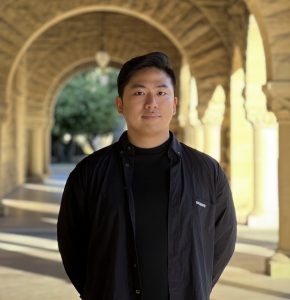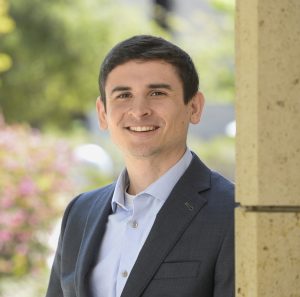 Join us in congratulating Stanford University students Il Rok Choi and Thomas Colburn, named to receive the 2025 ECS San Francisco Section Daniel Cubicciotti Student Award. Choi is recognized for his contributions to high-rate lithium metal batteries using asymmetric fluorinated ether solvents that enable fast charge transfer kinetics and high power operation. The award acknowledges Colburn’s novel methods of manufacturing nanomaterials using solution combustion synthesis.
Join us in congratulating Stanford University students Il Rok Choi and Thomas Colburn, named to receive the 2025 ECS San Francisco Section Daniel Cubicciotti Student Award. Choi is recognized for his contributions to high-rate lithium metal batteries using asymmetric fluorinated ether solvents that enable fast charge transfer kinetics and high power operation. The award acknowledges Colburn’s novel methods of manufacturing nanomaterials using solution combustion synthesis.
Learn more about the award and review the list of past recipients on the award page.
Il Rok Choi (Rok Choi)
 Rok Choi is a battery researcher specializing in electrolyte design for lithium-metal batteries. As a PhD candidate in Chemical Engineering at Stanford University under Professor Zhenan Bao, he develops electrolyte formulations and solvent systems to enable fast-charging and high-efficiency lithium-metal anodes. His work covers electrolyte synthesis, interfacial chemistry, and advanced characterization, addressing challenges like dendrite formation and side reactions to improve battery performance and stability.
Rok Choi is a battery researcher specializing in electrolyte design for lithium-metal batteries. As a PhD candidate in Chemical Engineering at Stanford University under Professor Zhenan Bao, he develops electrolyte formulations and solvent systems to enable fast-charging and high-efficiency lithium-metal anodes. His work covers electrolyte synthesis, interfacial chemistry, and advanced characterization, addressing challenges like dendrite formation and side reactions to improve battery performance and stability.
Choi researched nanocomposite cathode materials, gaining experience in battery materials while an undergraduate. In addition to research, he incorporates cost analysis and market strategy to connect scientific advancements with commercial viability. Choi is a student leader at Stanford StorageX and the Stanford Sustainable Mobility Initiative, working with industry and researchers on energy storage and transportation projects. These roles have strengthened his ability to collaborate across disciplines and manage projects effectively. Outside of research, Choi enjoys tennis and poker, which sharpen his strategic thinking. He is also passionate about jazz and electronic dance music (EDM). Combining technical expertise with a broader perspective on commercialization, he aims to develop practical solutions for next-generation battery technology.
Thomas Colburn
Thomas Colburn is a fifth-year PhD Candidate in Reinhold Dauskardt’s Materials Science and Engineering group at Stanford University, where he studies rapid, low-cost methods to manufacture metal oxide thin films and nanomaterials for solar cells, batteries, catalysis, and dielectrics. His work centers around transparent conducting oxides for perovskite solar cells, solid state Li electrolytes, and ordered meso/nanoporous oxides. He utilizes advanced x-ray scattering and spectroscopy techniques using synchrotron radiation at SLAC, Brookhaven NSLS-II, and MAX IV Laboratories.
Colburn received his undergraduate degree with Honors and Distinction in Chemical Engineering at Stanford in 2020, working with Prof. Zhenan Bao on the scalable fabrication of all-polymer organic photovoltaics. He was selected as a National Science Foundation Graduate Research Fellow and a Stanford TomKat Center Graduate Fellow for Translational Research. Outside of his scientific pursuits, Colburn is an award-winning saxophonist, section leader of the Stanford Wind Symphony, director of a Gregorian chant and sacred choral music choir, and passionate chef and gardener.
ECS San Francisco Section Daniel Cubicciotti Student Award
The ECS San Francisco Section Daniel Cubicciotti Student Award was established in 1994 to assist deserving students in Northern California pursue careers in the physical sciences or engineering. The award consists of a plaque and USD $2,000 prize to assist with educational expenses.
Nominations for the 2026 San Francisco Section Daniel Cubicciotti Student Award are accepted through February 15, 2026.
ECS Honors & Awards Program
ECS recognizes outstanding technical achievements in electrochemistry and solid state science and technology through the Honors & Awards Program. Highlight the contributions of our scientific community’s many deserving members by nominating them for awards!


